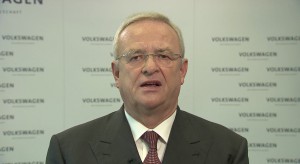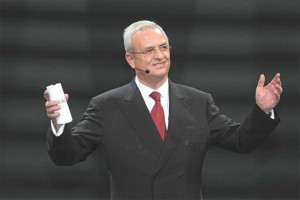While former Volkswagen CEO Martin Winterkorn is unlikely ever to actually face prosecution in the U.S., his legal problems appear to be just starting.
The 70-year-old Winterkorn resigned in 2015 shortly after the automaker confirmed reports it had cheated on diesel emissions tests, subterfuge that has so far cost it an estimated $30 billion. Last week, the former CEO became the latest VW executive to be charged in the case, U.S. prosecutors accusing him of conspiring to defraud the United States, as well as violating the Clean Air Act.
Germany has severe restrictions on extradition, meaning Winterkorn almost certainly would not be sent to the U.S. to face trial. But prosecutors in his home country are continuing their own investigation and could yet bring charges there. Meanwhile, VW’s board of directors is considering whether to seek damages from the one-time executive for his role in the cheating scandal.
That comes as the automaker continues its own probe into the diesel affair, spokesman Michael Brendel told German newswire dpa. “The investigation has been going on for quite some while and is conducted independently from the authorities’ investigation,” he explained.
(For more on the Winterkorn indictment, Click Here.)
In September 2015, the U.S. Environmental Protection Agency revealed that Volkswagen had installed a “defeat device,” an industry term for hidden software that was designed to detect when a vehicle equipped with a 2.0-liter diesel engine was undergoing emissions tests. If that was the case, the engine’s control system would sharply reduce production of noxious gases such as smog-causing NOx, as well as fine particulates linked to cancer and other health issues.
VW quickly acknowledged the scam and subsequently admitted rigging a larger, 3.0-liter engine used on upmarket products sold by the Audi and Porsche brands, as well. All told, about 550,000 vehicles sold in the U.S. were affected, along with 11 million more delivered worldwide.
Since then, the carmaker has settled a number of legal cases, including criminal charges leveled by U.S. and California regulators, as well as dealers, investors and diesel vehicle owners, all told costing the company an estimated $30 billion.
Eight VW employees, engineers and mid-level managers, had been charged in the case by American authorities. Two have gone to trial while the others have been able to avoid prosecution by remaining in Germany, the country’s constitution barring extradition of its citizens outside the European Union, or to international tribunal.
(Click Here to see the examination of Martin Winterkorn’s role in the diesel scandal.)
Winterkorn and several other executives who were charged in the case on Friday are not expected to be handed over to U.S. courts, either, unless they make the mistake of traveling to a country that has an extradition treaty with the U.S.
But the former CEO could yet face legal problems at home. For one thing, prosecutors in Braunschweig, the largest city in Volkswagen’s home region, are continuing their own investigation into the diesel affair and have questioned Winterkorn on several occasions, the now-retired executive also having gone in front of federal legislators where, in January 2017, he said, “As CEO I took political responsibility” for the scandal.
Winterkorn has denied knowing about the crime ahead of time, but that has long been in dispute and Braunschweig prosecutors could level charges similar to those laid out last week in the U.S. District Court in Detroit. They are known to be looking into allegations the former CEO withheld information about the cheating for months hoping to minimize the scandal’s impact on VW’s stock price.
It is not yet clear if VW itself will file a civil suit seeking recompense from Winterkorn though, in the best of circumstances, it likely would only be able to recover a fraction of what it will eventually wind up spending as a result of the diesel rigging case. Nonetheless, the German newspaper Frankfurter Allgemeine Sonntagszeitung reported over the weekend that Winterkorn could have much of his personal property seized if the automaker moves ahead and prevails in court.
It also remains unclear how much longer prosecutors will continue the ongoing investigation in Germany. Several other current and former senior executives reportedly remain under a cloud of suspicion.
(Big changes coming at VW under new CEO. Click Here to see what’s in store.)



